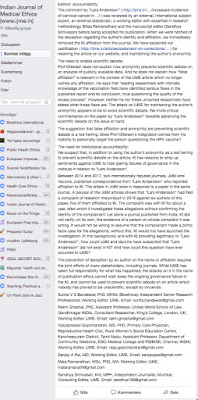I have posted two times (here and here) about the deeply misguided decision by the editorial management team of the Indian Journal of Medical Ethics not to retract a fraudulent, obviously "antivaxx" propaganda piece, article. On invitation, I have also summarised my opinion on this matter at the Daily Nous philosophy blog. In all of these posts, I have strongly underscored the otherwise very promising track and strong reputation of this journal, the importance of this for the critical place of global health and developing country perspectives in bioethics scholarship, and my strong wish for a revised course by the IJME editorial management. It is therefore with the greatest satisfaction I have been reached by the news that the same management has now revised its judgement, and decided to retract the article in question, inviting publicity also from the widely read Retraction Watch blog.
The retraction note is rather brief, but open and honest, and it speaks well of the integrity of the editorial management that it does not try to hide its own mistakes, or that the retraction occurred only as a result of pressure from the journal's editorial board and external commentators. It signs off by promising further elaborations in coming editorials. My hope is that these will set out clarified policies and routines that ensure that the journal in the future will keep strictly within its own declared area expertise and scholarship of "all aspects of healthcare ethics and the humanities, relevant to and/or from the perspective of India and other developing countries". This simple policy will save the IJME from any further scandals of the sort it has just escaped, and be a pillar for what I hope will be a further positive route of development of this otherwise excellent journal.
However, on one point, I strongly disagree with the position set out by the editorial management, and that is its apparent decision to continue to hide the identity of the proven fraudulent author that used to call him-/herself "Lars Andersson", falsely claiming affiliation to Karolinska Institutet. The editors are hereby promoting further research fraud by this person, undermining both other journals and research institutions from protecting themselves against this person's future activities. It also impedes appropriate disciplinary action to be taken by the academic or other institution to which the person formerly known as "Lars Andersson" is indeed affiliated. Finally, it impedes any analysis into the vested or other conflicts of interests linking to this person's activity to attempt to peddle fraudulent antivaxx articles. The argument by the editors, that it has promised the author to keep his/her identity a secret is not only invalid. The action makes the editors complicit in any further research fraud undertaken by this person. The promise itself is morally void, as the editors had no business making it in the first place, their primary obligation being to the research community, and not to proven research fraudsters. It is my sincere hope that the further elaborations on editorial policy promised, possibly by help of further dialogue with the journal's editorial board, will lead to revision of judgement also regarding this particular point.
***









